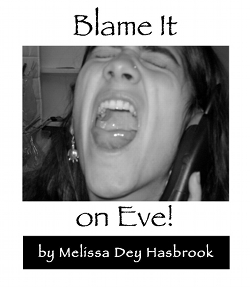 My first solo poetry compilation Blame It on Eve! debuted on CD in 2007. The City Pulse covered the release event “Poet Continues Push for Community through Couplets”.
My first solo poetry compilation Blame It on Eve! debuted on CD in 2007. The City Pulse covered the release event “Poet Continues Push for Community through Couplets”.
![]()
Victor Villanueva (Pullman, WA), Author of Bootstraps: From an American Academic of Color:
“Blame it on Eve! doesn’t blame Eve. The title is an irony. Or maybe it’s an echo. A profound one (irony or echo), one which Melissa Dey Hasbrook carves out with words: free verse, rigorously metered rhyming verse, sonnet to prose poetry. This is a wonderful, politically powerful collection, railing beautifully against institutions of all sorts: the academy, the State, the economy, the illusions of race and the realities of racism, and the institution of gender. At bottom, this is a tribute to women — to all that they give of life and love, of violence absorbed and resisted, of Word.”
![]()
Carol Davis Koss (Oklahoma City, OK), Author of Camera Obscura:
“One portion of Blame it on Eve! is titled ‘No Mincing Words’ and one thing Melissa Dey Hasbrook does NOT do is ‘mince words.’ Her poetry is both political and confessional, exploring her society, the larger world, and herself. Hasbrook is a performance poet and, in much of her work, even on the page, we can hear her voice and her passion.”
![]()
Leonora Smith (East Lansing, MI), Author of Spatial Relations:
“Melissa Dey Hasbrook’s poetry comes from her strong, relentless voice — a voice that rises not from the throat but from deep inside the body — from the solar plexus and the womb. Mad, damn mad, and sometimes wonderfully sassy; ‘I’d like to see Donald Trump make a toilet bowl shine,’ she says: that’s what it means to be ‘unskilled labor.’
“It’s no accident that the first poem in Hasbrook’s Blame It on Eve! opens with an epigraph from poet/feminist/political activist Susan Griffin. There are notes from other street corners in this book: call and response to the Beats’ harangues, to the slam scene’s tough percussions, to the protests of the working man and woman, and to all the never-back-down feminist poets who used their voices to name injustices and keep naming them until men and other women were forced to listen.
“Hasbrook’s kind of ‘edgy’ poem is honed like the edge of a blade to slice through crap, to stand off wife beaters, and to dismantle fences at the borders before Bush has time to put them up. It’s clear why she invokes Griffin, whose poem, ‘I Like to Think of Harriet Tubman,’ ends with the lines ‘there is always a time/for retribution/and that time/is beginning.’
“Hasbrook’s voice hits this and other notes, but her poetry is not the work of yesterday; it is the poetry of now. Like some other poets of her generation, Hasbrook is using her poetry as a way of imaging and making a space in this ‘post-emancipation proclamation nation’ where the words poet/feminist/activist don’t need backslashes. And this is where you find the sweetness in this book: generosity, gratitude running strong and, deep beneath the surfaces, hope that her words are making it possible for others to find a solid place to stand.”

